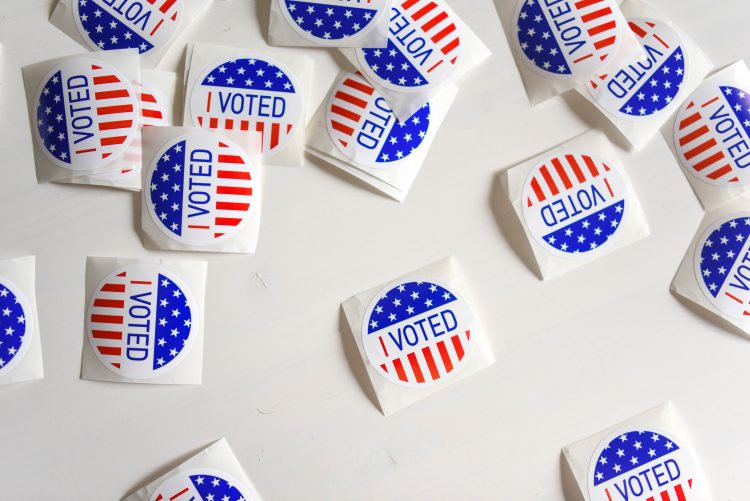September 30, 2024
How to raise informed, engaged and active young people
 With a big election coming soon, you may be having conversations with your children to encourage civic engagement and action. As a member of the UW community, you may interact regularly with young people and want to champion their civic engagement efforts.
With a big election coming soon, you may be having conversations with your children to encourage civic engagement and action. As a member of the UW community, you may interact regularly with young people and want to champion their civic engagement efforts.
It’s an important issue. In fact, it’s essential. After all, many of the political decisions we make today are going to affect the lives of young people the most.
Youth civic engagement
Civic engagement means different things given the context and can be broadly understood as choices and actions that improve communities and positively impact peoples’ lives. Civic engagement can include one’s political life, volunteering, participating in social movements, staying informed and seeking deeper education, and other kinds of democratic activities.
Why is youth engagement so important? When all people in a democracy — individually and collectively — get involved, take action and become empowered, communities prosper. Community groups and movements become more equitable and just, representing the diversity of perspectives held by the people who comprise them.
“One reason to focus on youth civic engagement is that such participation is a habit like any other: starting early can form a habit of civic engagement that will last a lifetime” (CIRCLE).
Political participation, and voting in particular, is one powerful and tangible way to have one’s voice heard and counted. Voting is often called our civic duty and getting out the vote is a prime example of civic engagement. In 2020, organizations and individuals took to social media in record numbers to engage with and encourage young first-time voters. Celebrities, athletes, and politicians used their platforms to encourage young adults to get involved.
Every two years, 7 million Americans turn 18 and become eligible to vote. By harnessing the potential of America’s youth and helping to direct their passion for social change, we create a powerful catalyst for shaping the future. And many issues affect youth directly: health care, housing, the environment, gun control and foreign policy, to name but a few.
A comic: How to get kids thinking about what it means to be a good citizen (NPR)
Youth civic engagement also addresses disparities in equity. By empowering young people from all demographics to participate in civic life, communities can redress the marginalization of certain groups – by race, gender, socioeconomic status, education level, sexual orientation – that have been historically underrepresented and unable to thrive.
Equitable representation in political life is essential for all communities to stop the cycle of underrepresentation and citizen disengagement.
Learn more
President Cauce has signed on to the All In Campus Democracy Challenge and committed to 100% student voter registration and turnout. For more info on student voting programs at UW, check out the campus-wide #HuskiesVote initiative from Student Life.
The Washington Secretary of State’s #FutureVoter program prepares soon-to-be-legal voters with clear information about when and how to vote. In Washington state, 16- and 17-year-olds can sign up as Future Voters and be automatically registered to vote when they become eligible.
UW Impact – UW Impact is the UW Alumni Association’s legislative advocacy program, dedicated to mobilizing alumni on behalf of restoring state support for the UW and public higher education. The UW Impact program has two main components: advocacy and education.
Rock the Vote – For over 30 years, Rock the Vote has revolutionized the use of pop culture, music, art and technology to engage young people in politics and build our collective power.
Alliance for Youth Action – Grows progressive people power across America by empowering local young people’s organizations to strengthen our democracy, fix our economy, and correct injustices.
Student PIRGs – Empowering students to shape the future they will inherit through training, supporting, and mobilizing to tackle climate change, protect public health, revitalize democracy and more.
NextGen America – Empowers young voters to engage in the political process and ensure our government is responsive to the largest and most diverse generation in American history.
The Civics Center – Provides free training and resources to help make voter registration part of the fabric of the high school experience in America.
 Support
Support
Consider making a one-time gift or setting up monthly payroll deduction through the UWCFD to one of these organizations working in civic action and democracy:
American Civil Liberties Union Foundation – Defends constitutional rights. Upholds free speech, religious liberty, equality, privacy and due process. Protects minorities, women, immigrants low-income people (charity code 0486265).
League Of Conservation Voters Education Fund – Helping organizations across America make protecting the environment a top-tier voting issue and advocating for sound environmental policy (charity code 0314991).
League of Women Voters of Washington – Strengthening the public’s knowledge of government through nonpartisan educational projects that help people understand public policy issues and become informed, active participants in their communities (charity code 1480788).
Institute for Community Leadership Training and Organizing – Organizing and training youth and families for meaningful civic engagement through leadership, community development and personal transformation (charity code 0456593).
re:Power – Providing training programs in leadership, organizing, non-partisan voter engagement, citizen activism, and issue advocacy for individuals, organizations and diverse communities (charity code 1479275).
Original article by Nicole Reeve-Parker
UW employees may only engage in political activity during non-work hours, on a personal computer or mobile device, and using a personal email address. Under state law (RCW 45.52.180), state resources cannot be used to promote one political position over another. Further, University policy prohibits the use of state resources for assisting an election campaign, promoting or opposing a ballot proposition or initiative, or lobbying the state legislature.